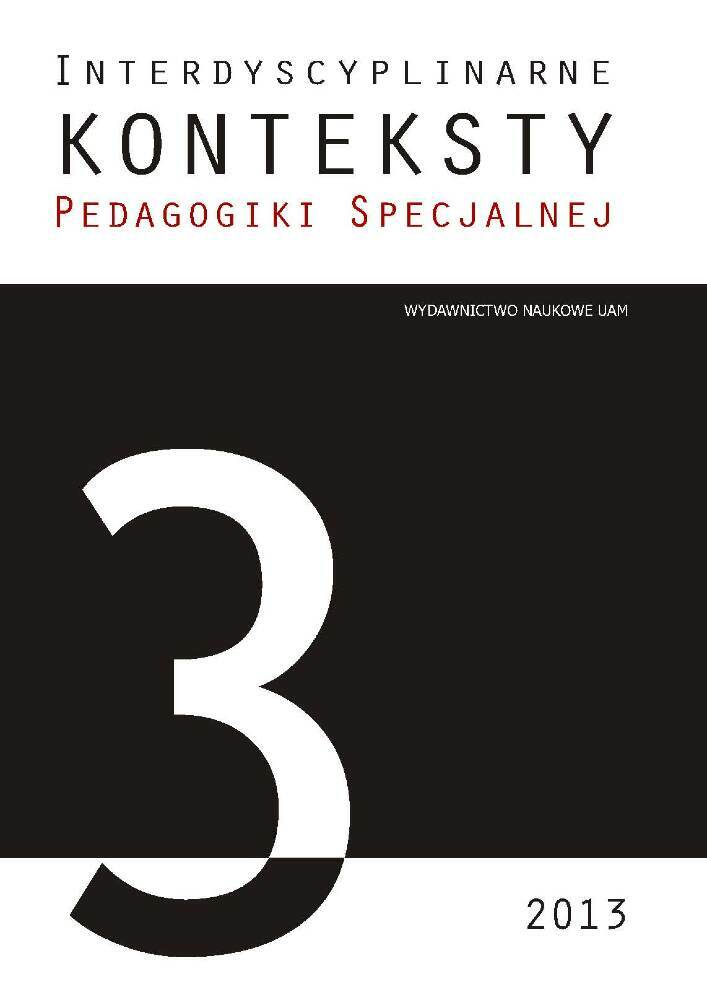Abstrakt
This article shows the impact of having a sibling with disabilities in the profession and career choices. Growing up with a brother or sister with a disability affects the development of personality traits and may be associated with the choice of professions related to helping people. This article presents a review of the literature devoted to this issue.
Bibliografia
BRADEN K., FRAZIER J., Faculty reflect on their siblings’ impact on their professional careers, 2012, http://www.umassmed.edu/uploadedFiles/Shriver_Center_Spot light_Newsletter_Late_Summer_2012.pdf, [dost?p: 9.12.2013].
BURTON S.L., PARKS A.L., The self-esteem, locus of control, and career aspirations of college-aged siblings of individuals with disability, „Social Work Research” 1994, 18(3),
s. 178–185.
CHAMBERS C.R., Siblings of individuals with disabilities who enters careers in the disability fields, „Teacher Education and Special Education” 2007, 30(3), s. 115–127.
EGET L.A., Siblings of those with developmental disabilities: career explorations and likelihood a choosing the helping profession, Indiana University of Pennsylvania, 2009, http://dspace.iup.edu/bitstream/handle/2069/163/Leslie%20Eget%20Corrected.pdf?sequence=1, [dost?p: 9.12.2013].
HUINKER H., The experiences of individuals with a sibling diagnosed with an Autism Spectrum Disorder, 2012, http://sophia.stkate.edu/cgi/viewcontent.cgi?article =1040&context=msw_papers, [dost?p: 9.12.2013].
KONSTAM V., DRAINONI M.N., Career choices and values of siblings with individuals with developmental disabilities, „School Counselor” 1993, 40(4), s. 287–292.
KOŚCIELSKA M., Odpowiedzialni rodzice. Z doświadczeń psychologa, Oficyna Wydawnicza „Impuls”, Kraków 2011.
MARKS S.U., MATSON A., BARRAZA L., The impact of siblings with disabilities on their brothers and sisters pursuing a career in special education, „Research & Practice for Persons with Severe Disabilities” 2005, 30(4), s. 205–218.
MINCZAKIEWICZ E., Dziecko upośledzone umysłowo i jego pozycja w rodzinie, [w:]
M. Chodkowska (red.), Dziecko niepełnosprawne w rodzinie. Socjalizacja i rehabilitacja, UMCS, Lublin 1995.
PORTER L., MCKENZIE S., Professional collaboration with parents of children with disabilities, Wiley, London 2000.
ROZMARYNOWSKA M., Naczynia połączone, [w:] J. Koral (red.), Rodzeństwo osób
z niepełnosprawnością, „Bardziej Kochani” 2013, numer specjalny kwartalnika.
ŚWIDA-ZIEMBA H., Młodzi w nowym świecie, Wyd. Literackie, Kraków 2005.
ŻYTA A., Rodzeństwo osób z głębszą niepełnosprawnością intelektualną, Oficyna Wydawnicza „Impuls”, Kraków 2004.
ŻYTA A., Życie z zespołem Downa. Narracje biograficzne rodzeństwa, rodziców i dorosłych osób z zespołem Downa, Oficyna Wydawnicza „Impuls”, Kraków 2011.
